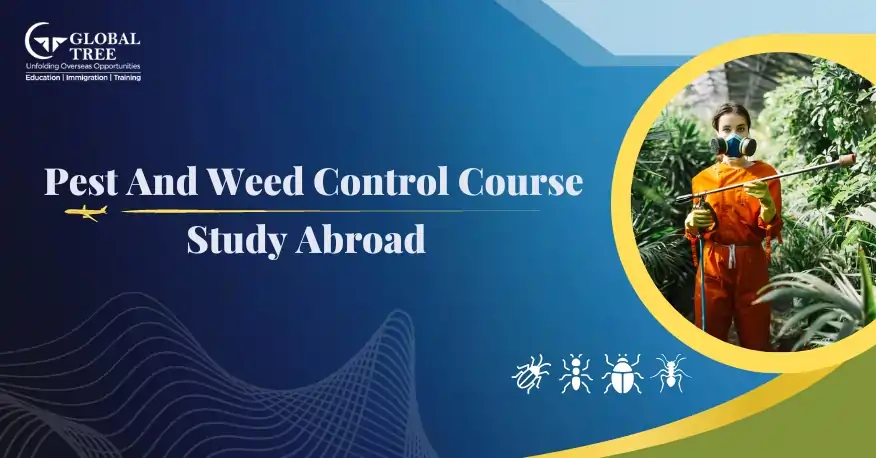All About Pest and Weed Control Course to Study Abroad

Introduction
Pest and weed infestation on crops is one of the main causes of crop failure. Farmers must employ strategies to keep these insects, pests, and weeds out of their crops. The study of pest and weed control is crucial for this aim.
Studies on weed control and pest management help experts create integrated pest management plans that incorporate environmentally benign and economically viable pest control methods. Choose the Best pest and weed control Course & Colleges to Study Abroad.
Who is eligible to study pest and weed control Course Abroad?
You must feel at ease working outside if you want to work in pest and weed control. Entomologists need to have no fear of insects and be prepared to handle their feces. Because their profession frequently requires them to watch and document details regarding insect behaviors, appearance, and habitat, pest and weed specialists need to have strong observational abilities. Additionally, depending on the task, specialists in pest and weed control need to be effective writers in order to present their findings to academics, students, decision-makers, and other stakeholders.
Strong critical thinking skills are required since they must be able to derive conclusions from evidence obtained through research, observation, and experiments. Pest & Weed Control may be an excellent option for you if this describes you.
How much does it cost to study pests and weed control Course Abroad?
A bachelor's degree abroad in pest and weed control can be earned for $7,408 to $18,634 per year while taking roughly 4 years to accomplish it. Depending on your area of specialty, the master's program lasts one to three years. In the US, the average tuition and fees for a curriculum in plant protection and integrated pest management range from $10,067 to $25,468.
What is the Future Scope of Pest and Weed control Course Abroad?
Better plant life and increased crop yield are now more important than ever. Population growth is a significant factor. The risk and severity of plant diseases have also increased with rising demand. We, therefore, require experts in pest and weed control to assist us in maintaining high output levels and avoiding crop disasters. The U.S. Bureau of Labour Statistics projects that the number of new positions for agricultural and food scientists would increase by 9% between 2020 and 2030. A further expectation for this decade is that there will be roughly 4,400 employment openings for agriculture and food scientists.
Trending Career Options in Pest and weed control Course Abroad
Students who want to pursue a career master’s in pest and weed control have a variety of employment possibilities to select from.
(Read more: top universities for MBA to study abroad)
Career as an Entomologist
Scientists who research insects and pests are known as entomologists. In controlled or naturalistic environments, they experiment with insects. In order to understand more about insect qualities like interactions with other species, habitat, reproduction, population dynamics, diseases, and migratory patterns, they also collect and analyze biological data and specimens.
Career as a Crop Advisor
A crop advisor or consultant offers guidance on crop management, including seeding, fertilizing, controlling pests, and treating plant diseases. Growers all across the world can boost crop productivity with the help of crop experts.
Career as a Horticulturist
A horticulturist's job is to grow crops, fruits, nuts, seeds, herbs, sprouts, mushrooms, flowers, grass, and decorative trees in gardens. It is the responsibility of horticulturists to increase the productivity, vigour, size, and flavour of plants. They also organize several projects for crop research. Expertise in a variety of plants, including trees, flowers, vegetables, nuts, bushes, and fruits, is required of horticulturists.


